Cover Story
Person of his people
He hot desks. He has relinquished the airline’s downtown headquarters. At the carrier’s offices near the Kuala Lumpur International Airport he works wherever he finds a seat. CEO and a Malaysia Airlines Berhad commercial pilot, Izham Ismail, is transforming the mindset and operating landscape of the national carrier. Associate editor and chief correspondent, Tom Ballantyne, reports.
October 1st 2021
It may not have been foresight but it certainly turned out to be prophetic. Read More » In mid-2019, well before the pandemic turned the airline world upside down, Malaysia Airlines Berhad (MAB) began experimenting with head office staff working from home. In the midst of a restructure aimed at recovering from losses and soaring debt, it was a way to economize.
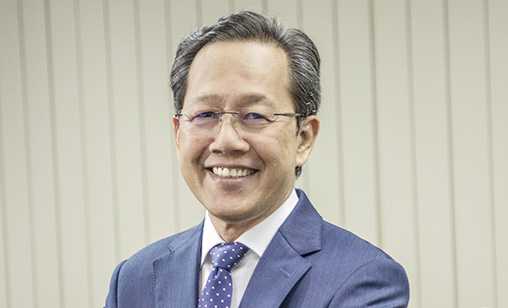 |
| ‘I reset the management team, the C-levels. I celebrate and respect inclusion so I brought in a new team. It did not have baggage and half of them were not even in the airline industry. Today, the average age of the C-suite is 45 years old. Very young people come in and challenge me. They say ‘hey, I know this is an airline, but what if’? People were able to think outside the box. People are closer to the management team now. Pull down the barriers of being superior and subordinate. We are all in this together.’ |
The airline’s office is adjacent to Kuala Lumpur International Airport, 80 kilometres from central Kuala Lumpur, CEO Captain Izham Ismail told Orient Aviation last month. “It was difficult to attract talent so we asked ‘what if we worked from home?’ Not knowing this would be the norm today, we started strengthening our infrastructure of working from home, working virtually.
“For our staff it meant they did not have to pay for petrol and toll charges and, indirectly, we were able to drive sustainability by shutting down more buildings. When 2020 arrived and the world went into crisis, Malaysia Airlines was an organization ready for virtual operations. In corporate Malaysia, MAB was the first organization to go fully virtual.”
Today, MAB’s operations are largely located in the South Support Zone at Sepang, near Kuala Lumpur International Airport, although most employees are working from home. “I have surrendered the office, giving it back to the Ministry of Finance so Malaysia Airlines is a full-blown working from home environment. I don’t have an office now. I just move around wherever I get a space,” Izham said. Of course, the carrier still has staff at the airport, working in maintenance and cargo, ground handling and at the airport terminal itself,” Izham said.
Going virtual may have set the airline up to cope with the pandemic but before the crisis hit it had been on a financial and leadership roller coaster ride. After the talents of popular CEO, Idris Jala, took him to politics as a high level policy troubleshooter in Malaysia’s government, Idris was succeeded by expatriate CEOs, Christoph Mueller and then Peter Bellew. Both arrived and departed within very brief periods of time.
They were followed by Jauhari Yahya, whose reign was dominated by two devastating fatal accidents: the disappearance of MH370 on a flight from Kuala Lumpur to Beijing in March 2014 and the shooting down of MH17 over the Ukraine in July of the same year.
As a result, MAB market share “dropped off the cliff” and staff morale hit rock bottom, said Izham, a 40-year veteran of the carrier and a pilot who rose to chief operating officer before being appointed CEO in November 2017. In an exclusive interview with Orient Aviation, he explained how close MAB came to bankruptcy, how staff morale was restored and how MAB won over creditors initially reluctant to support the airline group’s revamped business plan.
Following the fatal accidents of 2014, MAB was taken over by Khazanah Nasional Berhad, Malaysia’s sovereign wealth fund, but the company continued to report losses and debt levels still were climbing. Attempts to reset the organization with the Malaysia Airlines Restructuring Plan, or the MRP, were of limited success, although the staff payroll was reduced by 6,000 employees.
By the time Izham took charge, it was clear much more needed to be done to save the company. “When I took the job I said to myself there are so many things I need to fix, where do I start? I figured out I should focus on the people first. I had a 100-day plan and I was concentrating on the people. Then I decided what to do with the business and the biggest problem at MAB, the balance sheet,” explained Izham.
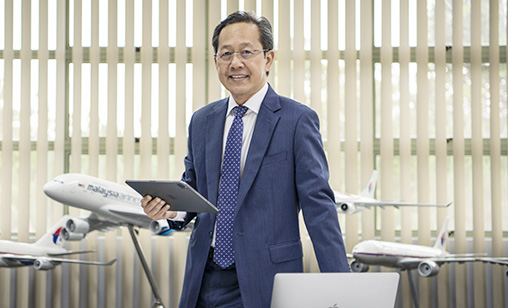 |
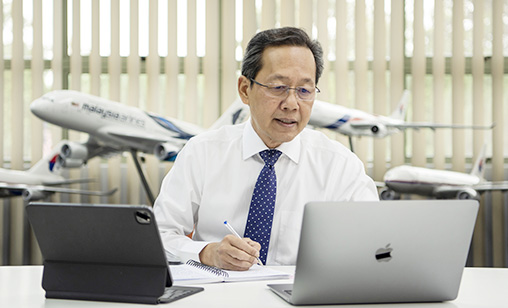 |
| ‘I told them – the employees on the ground in the hangar and baggage claim – I am not the CEO who walks on the red carpet. I am one of you guys. This organization helped me and my family. I have been here for the last 40 years, coming from a very poor background. My father earned 30 Ringgit a month. This company kept me alive. So tell me what’s wrong? By going on the ground I can hear them. I can feel them. I see them to a certain extent to really understand their pain’ |
A key issue was Malaysia’s airline market suffered from overcapacity, particularly with the presence of LCCs such as AirAsia. MAB was competing with them on their terms. An example, Izham said, was a domestic fare from Seoul to Jeju Island cost US$290. In Malaysia, 45-minute flights were being sold for $25. “I believed strongly the longer MAB was trapped in that market it would not be able to recover. So, in June of 2019 the team and I decided to go in the opposite direction,” he said.
“We went to market with a premium fare, but we surrounded the fare with products. When I talk about products it is not about meals. It is not about the quality of the food, but our frequency and ensuring we have a good size market and capacity in the marketplace, flexibility in bookings. We improved the customer experience.”
By operating as a premium carrier Izham does not mean luxury. MAB is not an Emirates or a Qatar, he explained. The transformation began to take effect. “In 2017, our net worth score was minus 22. In 2019 it went up to 27 plus. This a 40% movement,” he said. Market share also improved, rising from 17% pre-2019 to 25% shortly before the pandemic struck.
“In any organization that has been going for many years you have a lot of baggage like overstaffing and legacy processes. I started introducing the need to put our customers first. In 2018, we saw a change in customer satisfaction. We were seeing traction. Then in 2019 we recorded a record-breaking score on the customer satisfaction index, from a low of 67% to 78%-79%. At that time, the customers were coming back to us.”
Restoring morale was a key part of Izham’s strategy for the rebirth of MAB. For two years, he spent a couple of days every week “on the ground”, going in at three in the morning to join the baggage and ground handling teams to help them. “Not to spot check them but to understand their challenges and their problems,” he said.
“By doing that I could create conversations and they could take me as equal. On a Friday, for example, at the end of the week, after work ended at 5.30 or 6.30, I would do my evening prayers and then go to the hangar and mingle to hear what was happening on the ground.”
The result was quickly evident. Every year MAB conducts a staff survey. Historically, the results were hopeless, said Izham. Less than half of the staff participated. By 2019, that had risen to 74%. In 2020, it was 85% and this year it hit 91%.
Given it was in the midst of a restructure, the pandemic was the last thing the group needed. “In late November, early December 2019, when the Wuhan crisis came up, I said ‘hey, hang on, this is a crisis’. I assembled a team in December and said ‘I hope it won’t occur, but the organization needs to be prepared if this crisis spreads globally’,” he said.
“That was way before the pandemic was declared. As we all know, eventually the world went into crisis. When it evolved a lot of decisions had to be made. I told myself I did not want to retrench anyone so I asked [the team] how can we do this?. We initiated cost-cutting. We reduced our capacity. Grounded planes. Cut the salaries and allowances of board members and also of management.”
The outcome was interesting, Izham said. “By doing this, the organization became united. Initially, the management team was grumbling that their salaries were cut, but as time goes on, when lower income staff realize the management team sacrificed themselves to protect them, each of them comes to the management team and says boss thank you so much for sacrificing your salary to help us,” he said.
“And the senior management team think ‘oh my god I’m actually doing the right thing’ and because of that the organization is united.” Still, in 2019, MAB had a staff of 13,300. That is now down to 10,900 through attrition, people departing because they are unsure of the future of the industry and from contracts not being renewed.
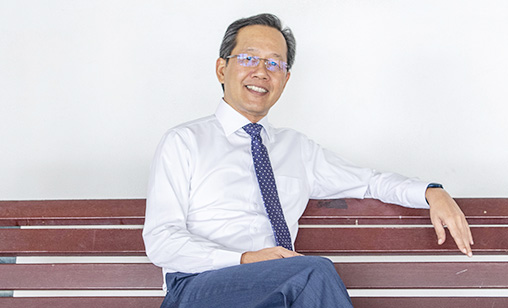 |
| ‘We did a lot of activities to cut costs, but the one that really strengthened the outlook of people was that I went to the board and told them ‘unfortunately I have to cut your salary. I have to cut your allowances’. From the board right to assistant managers, everybody at the top had to take a pay cut from 10% right up to 60%. This money saved and protected the lower income earners. The objective was to secure jobs so no-one would be retrenched and, at the same time, costs were being managed.’ |
Nevertheless, as the pandemic progressed, the balance sheet remained a major issue. “Around April, May, June (2020) something more drastic needed to happen. I went to the Board and said I believe this is the time for Malaysia Aviation Group (MAG) to reset its legacy issues with the balance sheet,” he said. MAG has three business sectors: airlines MAB, MASwings and Firefly; aviation services and e-commerce and travel services.
“The Board asked me: ‘What’s your proposal’?” Izham said. At that time, I was thinking of Chapter 11 (bankruptcy). Of course, the Board goes, ‘hey hang on’.” But Izham had been looking at other models, including Garuda Indonesia’s past move to run a Scheme of Arrangement, seeking to come to an agreement with creditors and filing a case in the UK and Singapore to gain approval for a restructure.
“Around July, we started engaging the Board. In August, I went to the Board and said this is what we need to do. They asked what the success rate might be. I said, to be honest, this is a long shot. Maybe 10%? I said 10% was better than nothing. Either you shut down this organization or you give management a chance to pursue this agenda.”
With Board approval, the management team set about talking with aircraft lessors, suppliers and investors. They worked 24 hour days engaging creditors across Asia, Europe and North America. Many creditors were reluctant participants, but the hard work paid off. In four months the team had won 100% participation from them.
Last February, the UK courts approved the deal as a “major component” of its restructuring program. The group’s sole shareholder, Khazanah, provided a 6 billion Ringgit (US$851 million) capital injection into the company to 2025.
MAB had launched a long-term business plan (LTBP) in 2019. By this year it had morphed into LTBP 2.0. “What is the long-term business plan? The organization is in crisis mode. We have one track driving the financial restructure, another team running the crisis as it is and another [group] developing the business plan,” said Izham.
“Today the legacy issue of MAB has been reset. We have reduced our liability by 15 billion Ringgit ($3.5 billion). We have addressed 10 billion Ringgit ($2.4 billion) of debt and we have brought down our debt to ebit ratio to 22%. We improved our balance sheet by 52%. So in the context of the financial restructure of MAB, we are lean and agile. What MAB needs today are for markets to re-open.”
TLBP2 has five pillars: focus on the airline’s own people, make the customer the centre of gravity, ensure security and safety is in its DNA, work at the business and the environment and understand digital is its universe.
It incorporates increasing synergies with commercial partners, including airline partners in the oneworld alliance. The Asia-Pacific will remain its main focus of operations for business and the breadth of the business will be widened.
“Instead of having the airline and the aviation services business, our corporate strategy is to migrate to the airline/aviation business: MAB and subsidiaries Firefly and MASwings, the aviation services business of ground handling, cargo operations and MRO and then introduce the e-commerce platform to harness travel and leisure both air and non-air.”
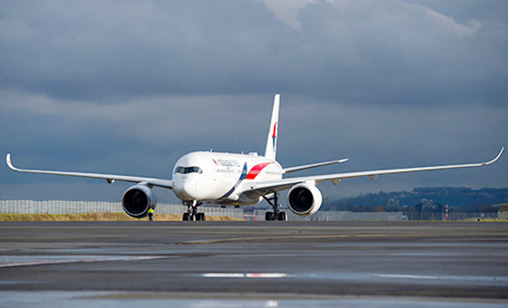 |
Like all airlines, COVID-19 has hit MAB operations hard. “We are operating at 15% capacity compared with 2019. Our forecast was that by quarter three this year we would be at minus 40% versus 2019. That was the plan,” Izham said.
“Because of the third wave happening globally and the border restrictions, today we are in the region of 15%-17%. We foresee, with the rate of vaccinations happening in ASEAN and especially in Malaysia, which today has the highest vaccination rate globally, we should be achieving 80% vaccinated by the first week of October.
“Put that modelling into play, with bookings coming in, we calculate the capacity MAB will be putting into the market by quarter four - the latest will be November- December - will be around 35%-40% versus 2019.”
MAB has 47 B737-800s, six A330-200s, six A330-300s, 15 A350-900XWB and six A380-800s. It also has firm orders for 25 B737 MAXs with 25 options. The A380s are grounded and are being sold. The airline is not exercising its options on the MAXs and expects to take the firm aircraft from 2023, with the last coming into the fleet by 2026.
As for the A380, Izham said it was a good aircraft during its time “but we strongly believe it does not fit our fleet just now or our future network. As soon as the fuel price hits $60 a barrel “the A380 is a goner”, he said. “It is hoped they will be sold by the end of this year. They should depart the fleet by the second or third quarter of 2022,” he said.
The network is expected to reach 70% of pre-COVID levels through 2022, Izham said, but the fleet, apart from the A380s, will remain the same because the company’s agreement with its creditors contains a contingent deferral arrangement on rentals. If the market drops and does not pick up, the rental will be pushed back to 2024. “Hence, we don’t have to let airplanes go and 90% of our planes are on operating lease. So, we will see MAB back to its original capacity by the second quarter of 2023,” Izham said.
Throughout the pandemic MAB has not received any funding from the Malaysian Government. “I believe strongly the responsibility of a company lies with its shareholders. I remain steadfast on that. If I go running to the government for cash they would have to do the same for my competitors so I would not do that,” he said.
Izham said MAB is a very different airline from a few years ago. “People are motivated. We are able to break down silos. For every project we run we appoint key members from across the organization so we have a cross functional team that runs projects,” he said. Even though they were working virtually, staff had been working from morning till 11pm, so much so that six months ago Izham introduced a 6pm “tools down” rule.
As for the future, he has no doubt there will be more challenges. “If you ask me if 2022 is a home run year my answer is no. I believe 2022 is still a pressure year. Organizations and airlines need to be aware that until COVID-19 is treated like the Dengue (fever), the flu or Malaria, consumers will be very conservative. Next year is a year of recovery, but not totally out of the crisis,” he said.
As for how Izham himself is weathering the pressure, he remains pragmatic. “Yes, I am tired. I am fatigued. I am burnt out. But every day I wake up and I tell myself and remind myself I believe in this journey and it’s not stopping now,” he said.
“In fact, my contract expired in November 2020. At that time, I thought it was perfect timing for me to leave. My chairman said ‘Izham, we need you’. Then I realized it would be so wrong of me to leave now. No doubt it would have been the easiest way out for me and would put all the problems behind me.
“But then where do I stand in the community? Where do I stand as person? So, I decided to stay on. It’s stressful and it’s pressured, but the last four years have been the experience of a lifetime. There is so much knowledge I have gained. Today, I am trying to extend this knowledge to people around me, getting my young C-suites to follow me on this journey of learning and discovering. It’s tiring yet interesting.”
Sandra Mason says:
May 29th 2022 05:27am